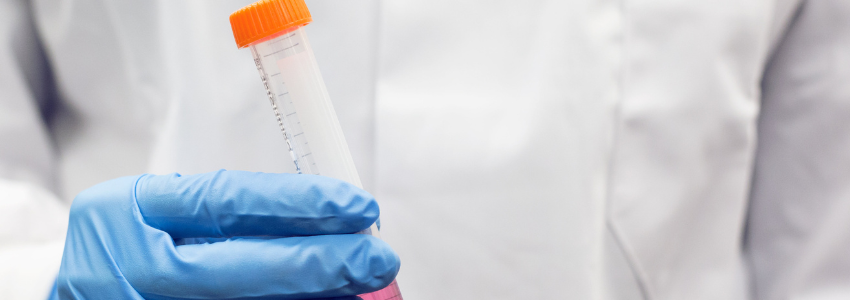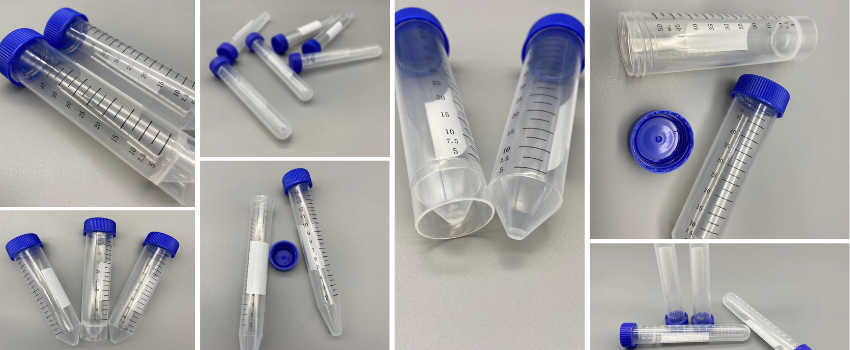Centrifuge tubes are a common experimental consumable in laboratories. They are used in conjunction with centrifuges for the separation and preparation of various biological samples. The biological sample suspension is placed in a centrifuge tube, and the centrifuge rotates at a high speed to generate a huge centrifugal force so that the tiny particles suspended in the tube (such as cell organelles, sedimentation of biological macromolecules, etc.) are deposited and separated due to density differences.


There are many types of centrifuge tubes. According to different centrifuge models and different experimental requirements, different centrifuge tubes can be purchased.

Glass centrifuge tubes: Glass is fragile and cannot be used in high-speed and ultra-speed centrifuges, only suitable for low-speed centrifuges.
Steel centrifuge tube: high strength, no deformation, heat, and frost resistance, but avoid contact with strong corrosive chemicals during use.
Plastic centrifuge tube: fully transparent or translucent, can see the centrifugation more intuitively; the hardness is small, the gradient can be taken out by puncture method; there is a tube cap to prevent leakage and deformation; the disadvantage is poor resistance to organic solvents and short service life.
For the accuracy of experimental results, many laboratories now use plastic centrifuge tubes as disposable consumables. The advantages of plastic centrifuge tubes can better meet the daily centrifugation needs of laboratories and are more widely used.
In plastic centrifuge tubes, the commonly used materials are polyethylene (PE), polycarbonate (PC), polypropylene (PP), etc. Among them, the performance of polypropylene (PP) is more prominent, so it has become the most popular choice for centrifuge tubes. The user's purchasing preference.

Microcentrifuge tube: 0.2/0.5/1.5/2ml, etc., often used in conjunction with a small centrifuge for the separation of a small number of experimental reagents.
Small-capacity centrifuge tube: 15/50ml, which is the specification of a centrifuge tube commonly used in laboratories.
Large-capacity centrifuge tube: Generally, a centrifuge tube with a capacity of more than 100ml is called a centrifuge bottle, which is the first choice for centrifugation of large-capacity somatic cells, granulation, and protein purification.

Round bottom centrifuge tube: When carrying out density gradient collection, you can choose a round bottom centrifuge tube. The round bottom has a large area and can withstand greater centrifugal force than the pointed bottom.
Conical bottom centrifuge tube: When the sample is small, it is more convenient to use a conical bottom centrifuge tube to collect the sediment, and the top liquid is also easier to draw with a plastic straw.
Flat-bottomed centrifuge tube: The main purpose is the same as that of the conical-bottomed centrifuge tube, but it can stand upright, making it easier to take and place in experiments.

Snap cap: Generally, microcentrifuge tubes are connected with a cover, and there is a ruler on the wall of the tube.
Plug-in cap: There is an overall capacity mark on the tube wall, and small-capacity centrifuge tubes not only have connected caps but also have plug-in caps and screw caps.
Screw cap: The tube wall contains a finer scale, and centrifuge tubes with a capacity greater than 50ml are basically screw caps.

Low-speed centrifuge tubes and high-speed centrifuge tubes can withstand different centrifugal forces and adapt to different-speed centrifuges.

Our centrifuge tube is made of polypropylene (PP), a transparent polymer material that meets the requirements of USP Class VI, and the cap is made of PE; there is no additive in the production process to ensure the high purity of the finished product; the inner and outer surfaces of the tube are smooth and uniform in color.

15ml can stably withstand the centrifugal force of 15000g
50ml can stably withstand the centrifugal force of 12000g
Uniform wall thickness, high-speed centrifugation does not burst the tube, safe and reliable
Chamfer's design, effectively prevents leakage
Large writing area with white silk screen printing on the tube body
Tube bottom: V-shaped conical bottom
Tube cap: flat cap thread, easy to operate even with one hand
The black silk screen scale is dried by UV light, not easy to rub off, clear and accurate
Maximum sealing negative pressure resistance -90Kpa/180s, no air leakage, no deformation
There is no sealing ring, and the sealing ribs inside the lid closely fit the beveled inner edge (chamfer) of the bottle mouth, effectively preventing liquid leakage
In order to meet the various needs of customers, JYBIO offers custom services including custom your own logo/cap color/package, etc. If you have any demands, feel free to contact us!
Contact: JYBIO
Phone: +86 158 7998 2901
Tel: 028-87033305
Email: info@jybioscience.com
Add: 10th Floor,Buiilding 1, No.68 Julong Road,Wuhou District Chengdu,Sichuan,CN
We chat
